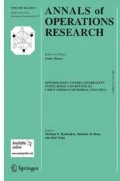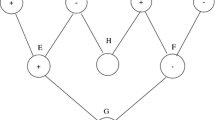Abstract
A modelling language for Integer Programming (IP) based on the Predicate Calculus is described. This is particularly suitable for building models with logical conditions. Using this language a model is specified in terms of predicates. This is then converted automatically by a series of transformation rules into a normal form from which an IP model can be created. There is also some discussion of alternative IP formulations which can be incorporated into the system as options. Further practical considerations are discussed briefly concerning implementation language and incorporation into practical Mathematical Programming Systems.
Similar content being viewed by others
References
A.L. Brearley, G. Mitra and H.P. Williams, Analysis of mathematical programming problems prior to applying the simplex algorithm, Mathematical Programming 8 (1975) 54–83.
W.F. Clocksin and C.S. Mellish,Programming in PROLOG (Springer-Verlag, New York, 1984).
R.E. Day and H.P. Williams, MAGIC: the design and use of an interactive modelling language for integer programming, IMA Journal of Mathematics in Management 1 (1986/87) 53–65.
A.M. Geoffrion and G.W. Graves, Multicommodity distribution system design by Benders decomposition, Management Science 20 (1974) 822–844.
R. Jeroslow, Representability in mixed integer programming, II: a lattice of relaxations, Georgia Institute of Technology, 1984.
R. Jeroslow and J.K. Lowe, Modelling with integer variables, Mathematical Programming Studies 22 (1984) 167–184.
R. Jeroslow and J.K. Lowe, Experimental results with the new techniques for integer programming formulation, Journal of the Operational Research Society 36 (1985) 393–403.
R. Jeroslow, Representability in mixed integer programming, I: characterization results, Discrete Applied Mathematics 17 (1987) 223–243.
M.H. Karwan et al. (eds.),Redundancy in Mathematical Programming: A State of the Art Survey (Springer Verlag, New York, 1983).
E. Mendelson,Introduction to Mathematical Logic (Van Nostrand, Princeton, 1964).
H.P. Williams, Logical problems and integer programming, Bulletin of the Institute of Mathematics and its Applications 13 (1977) 18–20.
H.P. Williams, Experiments in the formulation of integer programming problems, Mathematical Programming Studies 2 (1974) 180–197.
H.P. Williams, The reformulation of two mixed integer programming problems, Mathematical Programming 14 (1978) 325–331.
H.P. Williams,Model Building in Mathematical Programming (Wiley, Chichester, 1985).
Author information
Authors and Affiliations
Rights and permissions
About this article
Cite this article
McKinnon, K.I.M., Williams, H.P. Constructing integer programming models by the predicate calculus. Ann Oper Res 21, 227–245 (1989). https://doi.org/10.1007/BF02022101
Issue Date:
DOI: https://doi.org/10.1007/BF02022101




